In a momentous announcement, Omar Yaghi, along with Susumu Kitagawa and Richard Robson, has been awarded the 2025 Nobel Prize in Chemistry for their pioneering work on metal-organic frameworks (MOFs). These innovative materials, often described as "crystal sponges," have revolutionized the field of chemistry by providing highly porous structures capable of capturing gases, including hydrogen and methane, and even collecting water from air.
Yaghi, a renowned chemist and pioneer of Reticular Chemistry, has been instrumental in developing MOFs, which have nanoscale-size openings or pores. His work has been recognized globally, with significant implications for energy storage, carbon capture, and water collection. The technology has already been licensed by major companies like BASF, marking a significant step towards commercialization.
Impact and Future Implications
The development of MOFs has opened new avenues for addressing some of the world's most pressing environmental challenges. These materials can efficiently capture
CO₂, a key factor in climate change mitigation efforts. Moreover, their ability to store gases like
hydrogen makes them crucial for the development of sustainable energy systems.
Yaghi's achievement is not only a testament to his dedication to scientific innovation but also highlights the potential for chemistry to solve complex global problems. As the world continues to grapple with environmental and energy challenges, the work of Yaghi and his colleagues offers a beacon of hope for a more sustainable future.
Personal Reflections
In a recent interview, Yaghi shared his approach to science, stating,
"I set out to build beautiful things and solve intellectual problems". This philosophy has guided his career, leading to breakthroughs that have inspired a new generation of chemists and researchers.
What This Means
The recognition of Yaghi's work through the Nobel Prize underscores the importance of interdisciplinary research in advancing scientific knowledge. It also emphasizes the role of chemistry in developing solutions to global challenges, from energy storage to environmental conservation.
Key Features of MOFs
-
High Porosity: MOFs have nanoscale pores, allowing them to store gases efficiently.
-
Versatility: They can be designed to capture specific gases, such as CO₂ and hydrogen.
-
Potential Applications: Energy storage, carbon capture, water collection from air.
As the scientific community continues to explore the potential of MOFs, Yaghi's Nobel Prize serves as a milestone in the journey towards harnessing these materials for a more sustainable world.
Sources
1. Chemistry Nobel for scientists who developed massively porous ‘super sponge’ materials
2. Research News - Omar Yaghi - University of California, Berkeley
3. First reactions | Omar Yaghi, Nobel Prize in Chemistry 2025 - YouTube
4. The 2025 Nobel prize in chemistry as it happens – live | News
5. The Scientist: Science News, Educational Articles, Expert Opinion
6. Physics World: Home
7. Science News | The latest news from all areas of science
